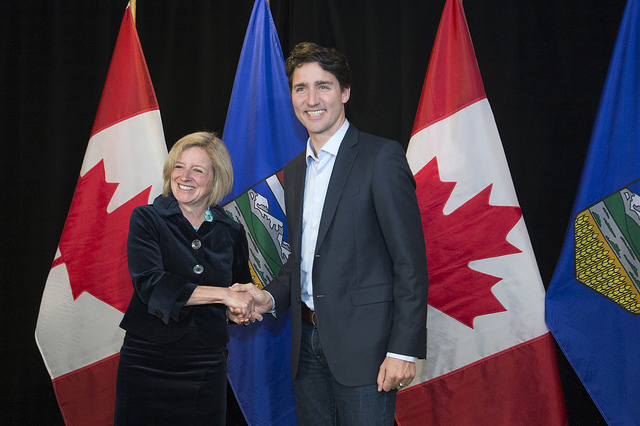Alberta’s NDP Premier Rachel Notley will not attend the national New Democratic Party convention in Ottawa that starts on Thursday, February 15. Notley knows most of the delegates will be opposed to the Kinder Morgan pipeline expansion, the Trans Mountain project.
Alberta has also stopped buying wine from British Columbia. That move is in retaliation for the minority B.C. NDP government’s efforts to delay, or even totally stop, Trans Mountain.
Across the country, pipeline opponents are buying B.C. wines in solidarity with the government of that province. And much of the media are happily focused on this NDP-vs.-NDP squabble.
Oddly, the federal Liberal government seems to be getting an easier ride than the divided NDP, even though it was Prime Minister Justin Trudeau’s government that gave the go-ahead for Kinder Morgan. Indeed, Trudeau and his ministers repeatedly insist that it is entirely within the constitutional purview of the federal government to approve such projects.
Approve the pipeline; then change assessments
During the last election campaign, the federal NDP said it would not allow Trans Mountain to go forward based on the Harper government’s truncated and inadequate approval process. Such massive projects require social license, NDP leader Tom Mulcair argued. Mega-project proponents must fully address environmental concerns and consult communities that could be affected, especially Indigenous communities. That did not happen for Trans Mountain on Harper’s watch.
The Liberals were less emphatic during the campaign than the NDP, but they did promise to toughen the federal environmental assessment process for approving mega projects.
Last week, half way through their mandate, Trudeau’s Liberals unveiled their plans for new tougher and more thorough assessments. But they did so many months after approving Trans Mountain, based, in essence, on their Conservative predecessors’ process.
A CBC interviewer asked federal Environment Minister Catherine McKenna if Trans Mountain would have received the green light under the new assessment process. An honest answer would have been, “Probably not, but impossible to say for sure, because it is entirely a hypothetical question.” Instead, McKenna defied the laws of logic and common sense and said, “Yes, Trans Mountain would have been approved.”
How does the minister know?
The legislation for the new process has not yet been passed, and nor, of course, have any new regulations been announced. And, of course, none of the officials who will, one day, undertake federal environmental assessments have been named. With so many imponderables and unknowns, it is more than disingenuous to blithely claim Trans Mountain could have met new more exacting environmental and community consultation standards.
McKenna’s answer was political bafflegab. She was saying: We approved the pipeline, ergo it is a good thing.
Now, the Trudeau government will work to get B.C. to back down and allow the expedited pipeline project to happen. The federal government’s claim of constitutional authority is questionable, at best. At any rate, experts are far from unanimous.
Constitution does not say national interest trumps environment
When those who wrote Canada’s original constitution, more than 150 years ago, assigned powers to the federal and provincial governments, environmental policy was an unknown concept. Since then, both levels of government have treated the environment as a shared responsibility. And so, the federal government cannot claim the B.C. government does not have a legitimate interest in protecting its own land, water and air. Instead, Trudeau relies on the concept of overriding national interest. His argument is simple: A single province cannot stand in the way of the federally determined national interest.
At what point, however, does national interest trump the legitimate concerns of communities and the environment? That is not at all self-evident or clear. In the end, if Trudeau wants to push the matter, he might have to ask the Supreme Court to decide.
As the dispute stands now, it is ironic to witness the new-found enthusiasm of some folks for B.C. wines.
Some of those same people were enthusiastic supporters of so-called strategic voting last time, and, for the most part, campaigned for Liberal candidates, even when the Liberals’ main opponents were NDPers, not Conservatives. One result of that effort was the defeat of a number of good NDP MPs, such as Megan Leslie in Halifax and Craig Scott in Toronto. Another and more significant result was the election of a Liberal majority government with only 39 per cent of the vote.
Had the 2015 election produced a minority government, with the Liberals needing NDP or Green support to pass legislation, the Trans Mountain pipeline drama might now be unfolding in a rather different way.
A minority Liberal government would likely have moved quickly to fulfill the promise of a new environmental assessment process, which would entail a considerable delay in any decision on Trans Mountain. The Liberals’ only alternative course would have been to ally themselves with the Conservatives, which would have been political poison.
But that is all conjecture.
Today, we have yet another false and artificial majority government, this time a Liberal one, and erstwhile supporters of those Liberals are now gleefully quaffing B.C. wine. It is a case of principled protest meeting the pleasure principle.
At the same time, those wine-soaked activists they have little to say about a federal government that betrayed its promise not to approve Kinder Morgan’s project based on Stephen Harper’s discredited assessment process.
It’s not fair, but who said politics is supposed to be fair?
Photo: Chris Schwarz/Government of Alberta
Like this article? Please chip in to keep stories like these coming.




